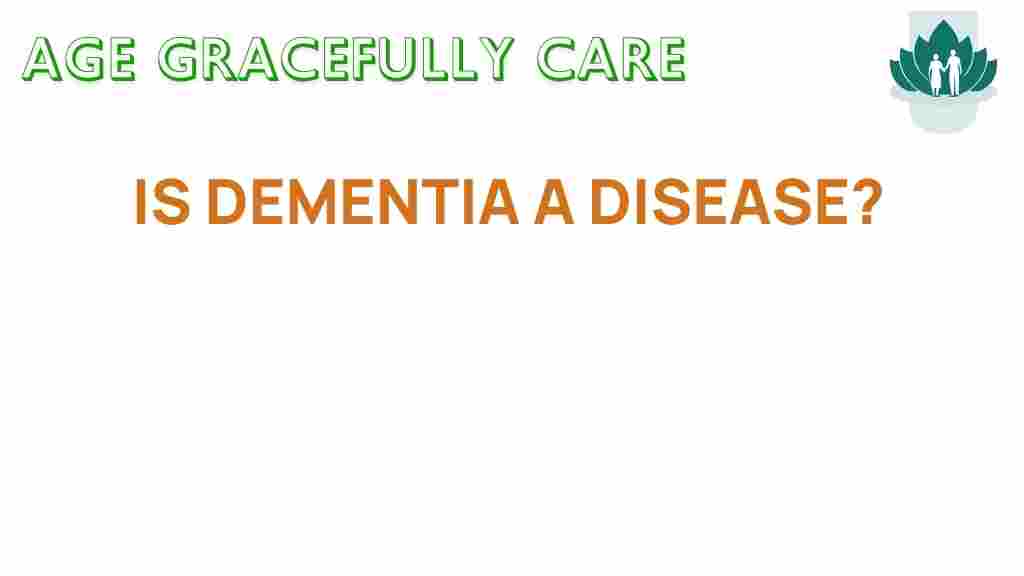Is Dementia a Disease? Unraveling the Complexities of Cognitive Decline
Dementia is a term that often conjures up feelings of fear and confusion for many, especially as it relates to aging and brain health. With an increasing number of individuals experiencing symptoms of cognitive decline, understanding the nature of dementia is more critical than ever. But the question remains: is dementia a disease? This article delves into the intricacies of dementia, exploring its definition, types, causes, and implications on health and society.
Understanding Dementia and Cognitive Decline
Dementia is a broad term used to describe a range of symptoms associated with a decline in cognitive function. It affects memory, thinking, and social abilities severely enough to interfere with daily life. While many people associate dementia with aging, it is not a natural part of the aging process. Instead, it is a result of various neurological disorders that cause degeneration of brain health.
Some of the most common types of dementia include:
- Alzheimer’s Disease: The most prevalent form, accounting for 60-80% of dementia cases.
- Vascular Dementia: Often a consequence of stroke or other conditions that affect blood flow to the brain.
- Lewy Body Dementia: Characterized by abnormal protein deposits in the brain.
- Frontotemporal Dementia: Involves degeneration of the frontal and temporal lobes of the brain.
The Causes of Dementia
Understanding the causes of dementia is essential for unraveling its complexities. Several factors contribute to cognitive decline, and these can be categorized into:
- Genetic Factors: Certain genes may increase the risk of Alzheimer’s and other types of dementia.
- Lifestyle Factors: Poor diet, lack of exercise, smoking, and excessive alcohol consumption can contribute to cognitive decline.
- Medical Conditions: Conditions such as diabetes, hypertension, and heart disease are linked to an increased risk of dementia.
- Aging: Age is the most significant risk factor, with most cases occurring in individuals over 65.
Symptoms and Diagnosis of Dementia
Recognizing the symptoms of dementia is crucial for early diagnosis and intervention. Common signs include:
- Memory loss that disrupts daily life
- Difficulty in planning or solving problems
- Confusion with time or place
- Challenges in understanding visual images and spatial relationships
- Problems with speaking or writing
- Withdrawing from work or social activities
If you or a loved one exhibits these symptoms, it is important to consult a healthcare professional for a thorough evaluation. Diagnosis typically involves a combination of:
- A detailed medical history
- Cognitive and neurological tests
- Brain imaging tests like MRI or CT scans
Research and Advancements in Understanding Dementia
The field of dementia research is rapidly evolving. Scientists are continually exploring the underlying biological mechanisms of cognitive decline and potential therapeutic interventions. Some promising areas of research include:
- Biomarkers: Identifying specific biological markers that can help diagnose dementia earlier.
- Medication Trials: Developing drugs that can slow the progression of diseases like Alzheimer’s.
- Non-Pharmacological Interventions: Exploring the benefits of cognitive training, physical activity, and social engagement on brain health.
For more information on the latest studies and findings, visit the Alzheimer’s Association research page.
Managing and Coping with Dementia
While there is currently no cure for most forms of dementia, several strategies can help manage symptoms and improve quality of life:
- Establishing Routines: Familiar and structured routines can help individuals feel more secure.
- Engaging in Cognitive Activities: Puzzles, reading, and memory games can stimulate brain function.
- Physical Activity: Regular exercise is beneficial for overall brain health.
- Healthy Diet: A balanced diet rich in fruits, vegetables, and omega-3 fatty acids can support brain health.
- Social Involvement: Maintaining social connections is vital for emotional well-being.
Support for Caregivers
Caring for someone with dementia can be challenging. Caregivers must prioritize self-care to maintain their own health and well-being. Here are some tips:
- Join Support Groups: Connecting with other caregivers can provide emotional support and practical advice.
- Take Breaks: Regularly scheduled breaks can help alleviate caregiver stress.
- Learn About the Disease: Understanding dementia can demystify the experience and help caregivers cope better.
In conclusion, dementia is indeed a complex condition that results from various neurological disorders leading to cognitive decline. While it poses significant challenges for individuals and families, understanding its nuances can empower better management and care strategies. As research continues to evolve, there is hope for improving outcomes for those affected by dementia, particularly Alzheimer’s disease.
As we continue to confront the realities of aging and cognitive health, it is essential to foster awareness, support, and compassion for those navigating the challenges of dementia. If you or someone you know is facing these issues, consider reaching out to healthcare professionals for guidance and support. For further insights on brain health and neurological disorders, explore our resource page.
This article is in the category Health and created by AgeGracefullyCare Team
